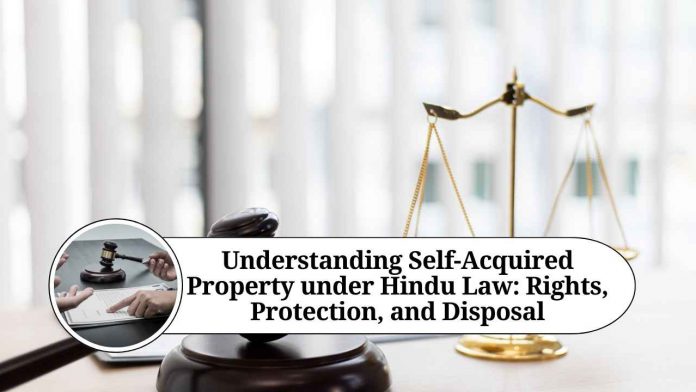Self Acquired Property under Hindu Law: Understanding the Basics
Hindu Law recognizes two types of property – ancestral property and self-acquired property. While ancestral property is the property that is inherited from one’s ancestors, self-acquired property refers to the property that an individual has acquired through his or her own efforts, skills, or resources. In this blog, we will delve deeper into the concept of self-acquired property under Hindu Law and discuss its various aspects.
Acquisition of Self-Acquired Property
Self-acquired property can be acquired in several ways, such as:
- By purchase: A person can acquire self-acquired property by purchasing it from his or her own resources or earnings.
- By inheritance: Self-acquired property can also be inherited by a person from his or her spouse, parents, or relatives.
- By gift: A person can also acquire self-acquired property through gifts from his or her spouse, parents, or relatives.
- By personal skill and effort: Self-acquired property can also be acquired by an individual through his or her own personal skill and effort, such as by starting a business or by earning a salary.
Ownership of Self-Acquired Property
The ownership of self-acquired property depends on the mode of acquisition. If a person acquires self-acquired property by purchase, then he or she becomes the absolute owner of the property. However, if the property is acquired through inheritance or gift, the ownership of the property is subject to certain restrictions under Hindu Law.
Hindu Succession Act, 1956 and Self-Acquired Property
The Hindu Succession Act, 1956 lays down the rules regarding the devolution of self-acquired property among the legal heirs of a Hindu individual. The Act applies to all Hindus, including Buddhists, Sikhs, and Jains.
As per the Act, the self-acquired property of a Hindu male, who dies intestate (without making a will), devolves first to his wife and children. If the Hindu male has no wife or children, then the property will devolve to his parents. If the parents are not alive, then it will devolve to the heirs of the father.
In the case of a Hindu female, who dies intestate, her self-acquired property devolves first to her husband and children. If the Hindu female has no husband or children, then the property will devolve to her parents. If the parents are not alive, then it will devolve to the heirs of the father.
Protection of Self-Acquired Property
Self-acquired property is protected under Hindu Law, and no one can claim a share in it without the owner’s consent. This means that even the legal heirs of a person who has acquired self-acquired property cannot claim a share in it during the owner’s lifetime. However, after the owner’s death, the legal heirs can claim a share in the property as per the rules of succession.
Disposal of Self-Acquired Property
A person who owns self-acquired property has the right to dispose of it as per his or her wishes. The owner can sell, gift, or will away the property to anyone he or she desires. However, in case of a will, the property must be disposed of as per the provisions of the Indian Succession Act, 1925.
In case the owner dies intestate (without making a will), the self-acquired property will be distributed among the legal heirs as per the provisions of the Hindu Succession Act, 1956.
Self-Acquired Property vs Joint Family Property
It is important to note that self-acquired property is different from joint family property, which refers to the property that is inherited by the members of a Hindu joint family. In the case of joint family property, every member of the family has a right to a share in the property, irrespective of who acquired it.
However, in case of self-acquired property, only the owner has the right to dispose of it, and no other member of the family has any claim over it.
Conclusion
In conclusion, self-acquired property is an important concept under Hindu Law, and understanding its various aspects is crucial for individuals who own such property. It is important for individuals to ensure that their property is distributed as per their wishes after their demise, and for this, they should make a will and take other necessary legal steps.
Frequently Asked Questions (FAQs)
What is self-acquired property under Hindu Law?
Self-acquired property refers to the property that an individual has acquired through his or her own efforts, skills, or resources, without any inheritance or gift.
How can self-acquired property be acquired?
Self-acquired property can be acquired in several ways, such as by purchase, inheritance, gift, or personal skill and effort.
What is the difference between ancestral property and self-acquired property?
Ancestral property is the property that is inherited from one’s ancestors, while self-acquired property is the property that an individual has acquired through his or her own efforts, skills, or resources.
Who has the ownership of self-acquired property?
The ownership of self-acquired property depends on the mode of acquisition. If a person acquires self-acquired property by purchase, then he or she becomes the absolute owner of the property.
What are the rules for the devolution of self-acquired property among legal heirs under Hindu Law?
The rules for the devolution of self-acquired property among legal heirs are laid down under the Hindu Succession Act, 1956.
Can legal heirs claim a share in self-acquired property during the owner’s lifetime?
No, legal heirs cannot claim a share in self-acquired property during the owner’s lifetime.
Can an owner of self-acquired property dispose of it as per his or her wishes?
Yes, an owner of self-acquired property has the right to dispose of it as per his or her wishes, by selling, gifting, or willing away the property.
What happens to self-acquired property in case of the owner’s death?
In case of the owner’s death, the self-acquired property will be distributed among the legal heirs as per the provisions of the Hindu Succession Act, 1956.
Is self-acquired property the same as joint family property?
No, self-acquired property is different from joint family property, which refers to the property that is inherited by the members of a Hindu joint family.
How can a person ensure that his or her self-acquired property is distributed as per his or her wishes after his or her demise?
A person can ensure that his or her self-acquired property is distributed as per his or her wishes by making a will and taking other necessary legal steps.




















